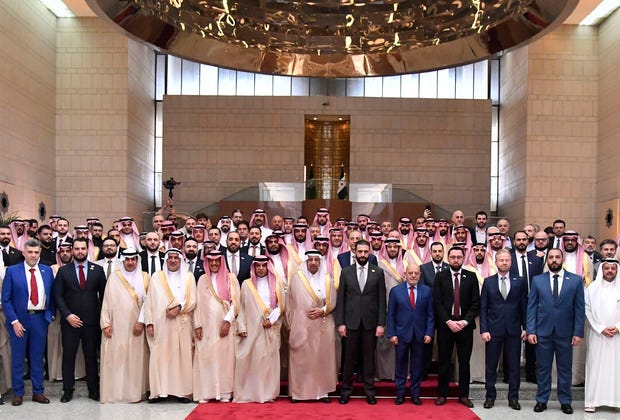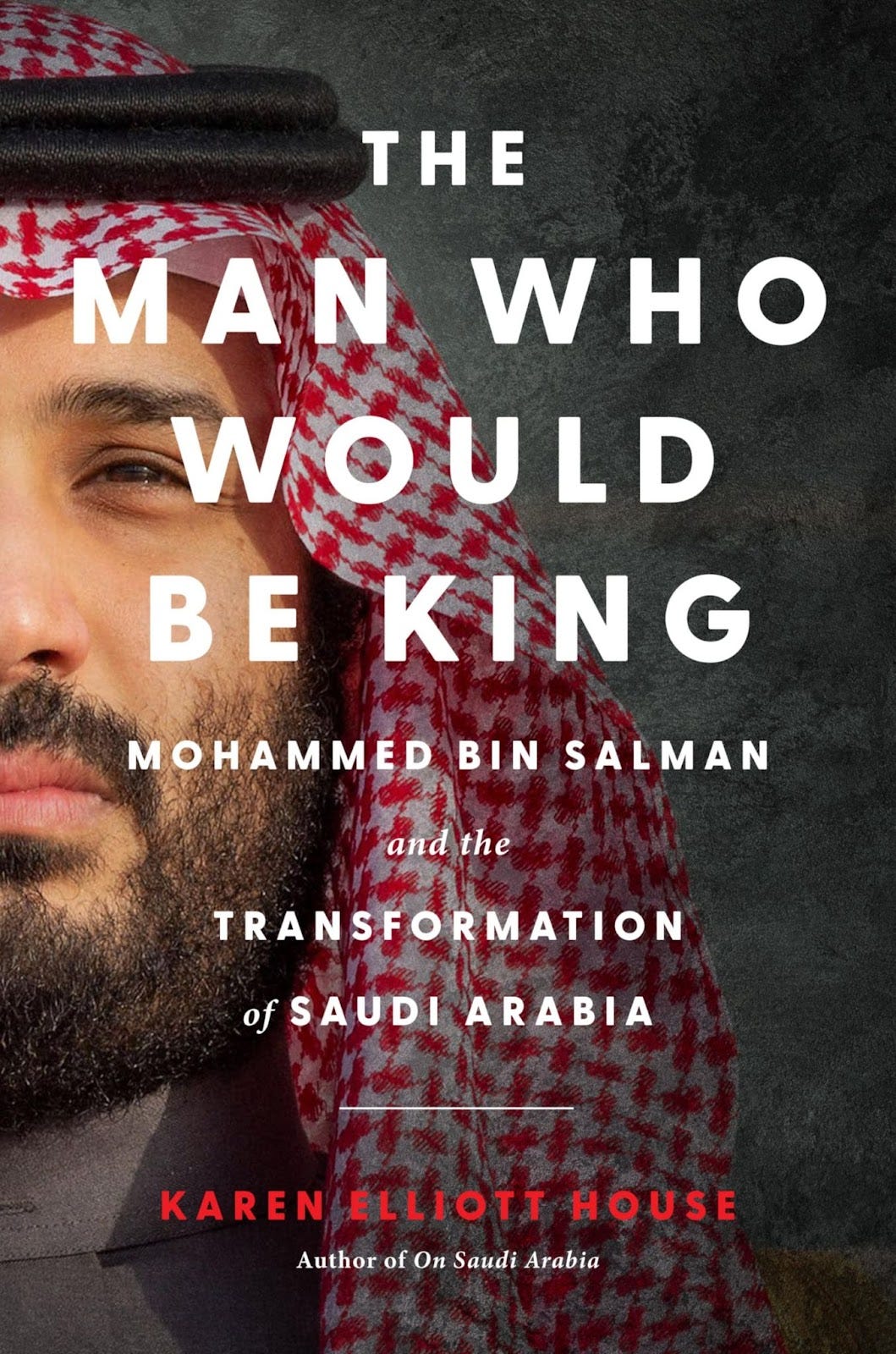Gulf Nashra Weekly Digest
Gulf commentators discuss Saudi investments in Syria, Kuwait’s oil project surge, and a new book on MBS.
Media Coverage
Geopolitics
“Saudi Arabia announces $5bn in Syria investments.” Arab News, July 23, 2025.
“The delegation of some 150 investors and representatives of the Saudi public and private sectors, led by Investment Minister Khalid Al-Falih, attended a forum in Damascus.”
Go Deeper: “Saudi business delegation arrives in Syria; deals worth $4 billion to $6 billion seen being signed.” Reuters, July 24, 2025.
Bahrain: “HM King receives HE Lebanese President.” BNA, July 23, 2025.
“His Majesty King Hamad bin Isa Al Khalifa received His Excellency General Joseph Aoun, President of the Lebanese Republic in the presence of His Royal Highness Prince Salman bin Hamad Al Khalifa, the Crown Prince and Prime Minister, at Gudaibiya Palace, on the occasion of HE President Aoun’s visit to the Kingdom of Bahrain.”
Domestic
“The NIDLP program contributes $262 billion to supporting Saudi Arabia’s non-oil economy.” Asharq Al-Awsat, July 20, 2025.
“According to the NIDLP’s annual report, the program’s activities contributed SAR 986 billion (approximately $263 billion) to the non-oil GDP, representing 39% of the total non-oil GDP — compared to SAR 949 billion (around $253 billion) in 2023.”
Go Deeper: “Annual Report, 2024, National Industrial Development and Logistics Program.” [PDF].
“Oman’s foreign direct investment exceeds RO 30 billion in Q1 2025.” The Arabian Stories, July 21, 2025.
“FDI inflows during the period amounted to RO 5.225 billion, marking a notable increase compared to RO 4.111 billion in the same quarter of 2024.”
Go Deeper: “GCC Trading Activity Quarterly Report - Q2-2025.” KAMCO, July 14, 2025. [PDF].
“The Custodian of the Two Holy Mosques presides over the Cabinet session.” SPA, July 22, 2025.
“The Custodian of the Two Holy Mosques, King Salman bin Abdulaziz Al Saud — may God preserve him — chaired the Cabinet session held today in Jeddah.”
“Kuwait’s oil projects surge to $18.5 billion, but execution lags behind.” Times of Kuwait, July 22, 2025.
“This marks a sharp increase from $14.3 billion in May 2024, driven by a wave of new project planning and pre-execution activity. However, while the upward trend is encouraging, the figure remains significantly below the 2019 peak of $65 billion—a reminder that the sector still has a long road ahead toward full revitalization, reports Al-Qabas daily.”
“UAE bank assets climb to $1.29tn in April as credit, deposits rise.” Arab News, July 24, 2025.
“This comes amid diverging banking trends across the Gulf, with Kuwait reporting a 6.7 percent year-on-year rise in total assets to 93.51 billion dinars ($303 billion) in March, and Saudi Arabia recording a 7.4 percent increase to SR5.3 trillion ($1.41 trillion) in April.”
Go Deeper: “Statistical Bulletin - Banking & Monetary Statistics.” Central Bank of The UAE. June 24, 2025, [PDF].
“55% Processed via POS Terminals: Qatar Central Bank Reports 54.9 Million Payment Transactions in June.”
“It noted that 55% of these transactions were processed via point-of-sale (POS) terminals, while e-commerce accounted for 27%..”
“The Fawran instant payment system captured 17%, and mobile phone payments ranked last with about 1% of the total transactions.”
Go Deeper: “Payment Systems Statistics June 2025. Qatar Central Bank, June 2025. [PDF].
“Strong growth predicted for Qatar with increased gas sales.” AGBI, July 22, 2025.
“Qatar’s economy is expected to grow 5.5 percent in 2026, supported by an expansion in gas output and a rise in LNG exports.
Go Deeper: “Standard Chartered: Qatar's Growth Outlook Strengthens Amid Global Instability.”QNA, July 21, 2025.
Kuwait: “Cabinet proposes 50 bln dinars Al-Kout Investment Co to drive economic diversification.” Times of Kuwait, July 20, 2025.
“The initiative, spearheaded by Finance Minister Noura Al-Fassam, aims to transform Kuwait’s economic landscape by supporting large-scale infrastructure projects and reducing the country’s reliance on oil revenues, reports Al-Qabas daily.”
Gulf Opinions
Following the announcement of substantial economic agreements during the Saudi-Syrian Investment Forum on July 24, Saudi commentators welcomed the growing cooperation between the two countries in rebuilding Syria, despite concerns expressed by Gulf commentators over the ongoing political challenges facing the Syrian government. Firas Trabelsi argued that these agreements reflect “a shift in the engineering of Saudi influence in the region,” emphasizing that “Riyadh does not view its neighboring markets as trading venues, but rather as areas of long-term influence managed through economic tools rather than policy statements.” In essence, he contends that Saudi Arabia is not entering Syria merely as an “external investor,” but is seeking to economically redefine the country within a broader regional vision led by Riyadh and rooted in economic principles. Similarly, Khalid Al Malik, Editor-in-Chief of Al-Jazirah newspaper, asserted that the challenges facing Syria could be addressed through strategic investment and economic engagement. He maintains that with this scale of commitment and high-level public-private sector participation, economic cooperation can foster lasting stability in Syria and help prevent the recurrence of past crises. In the same context, Moudi Al Helfi tweeted that “The Saudi-Syrian rapprochement is not merely political; it is a restoration of a deeply fractured Arab foundation that is long overdue for rebuilding. When Riyadh reaches out to Damascus, the map of the Middle East sees hope expand.” At the corporate level, the Saudi commentator "Columbuos" noted on Twitter that in light of major agreements signed in Syria by Elm Company and STC, it is worth recognizing that Elm is “the company that designed, launched, and operates platforms like Absher and Tawakkalna, among many other government platforms. It is a publicly listed Saudi tech company specializing in localizing and innovating technology and science.” Echoing this optimistic sentiment, Khalid Al Saud tweeted that “the new Syria, under its legitimate, loyal president Ahmed Al-Sharaa and guided by the directives of His Highness the Crown Prince, has become a prime destination for Saudi investors—and soon, God willing, it will be the top preferred tourism spot for all GCC countries.” On the political front, Kuwaiti commentator Dahem Al Qahtani remarked that despite its recent formation, the new Syrian regime has already made notable political and economic strides, defying the expectations of both visible and covert adversaries who predicted its rapid collapse. He added that hopes now rest on the government to overcome its current challenges and to lead with a focus on national cohesion and collective Syrian interests, rather than fragmented ambitions.
More Gulf Opinions
“These projects will create tangible job opportunities for Syrian citizens, serve as a means to help the country recover from its economic hardships, and encourage other nations to contribute to investment in Syria.”
Khalid Almalik, Al Jazirah, (Saudi Arabia), July 25, 2025.
“Today, some Druze in Syria welcome the Israeli attacks on Damascus, and some of their leaders are calling for direct intervention by Israeli forces. The pressing question now is: Are Syria’s Druze making the same mistake that the Shia of southern Lebanon once did?”
Mohammad Alsaaed, Okaz, (Saudi Arabia), July 24, 2025.
“It is clear that there is a regional mobilization to launch military operations targeting Syria and Lebanon, extending to Iraq. This plan is being prepared and executed with precision, with the first step being to ignite a war between Sunnis and minorities, then Sunnis against Sunnis, and finally Sunnis against Shiites.”
Fakhri Rajab, Alqabas, (Kuwait), July 21, 2025.
“Given the Syrian reality, one can understand the rationale behind the Kurdish and Druze demands for a decentralized political system in Syria.”
Mohammad Alkanaan, Al Jazirah, (Saudi Arabia), July 25, 2025.
Gulf Nashra Picks
Book: Karen Elliott House “The Man Who Would Be King: Mohammed bin Salman and the Transformation of Saudi Arabia.” Harper Academic, July 8, 2025.
Podcast: “Interview with CEO of Kuwait Petroleum Corporation Sheikh Nawaf Saud Al-Sabah.” Discussion with Al-Burjas, Jul 6, 2025. [English Subtitle].
Analysis: “UAE Defense Industry Ambitions.” Leonardo Mazzucco, Arab Gulf States Institute in Washington, July 22, 2025.
Analysis: “The Gulf’s Carbon Reckoning.” Christopher Gooding, Arab Gulf States Institute in Washington, July 18, 2025.
Analysis: “Turning Point or Setback? The Future of GCC–Iran Relations.” Layla Ali, Gulf Research Center, July 21, 2025.
Analysis: “GCC will focus on low-risk technical coordination.” Oxford Analytica, Wednesday, July 23, 2025.
Podcast: “Saudi Is About to Change the World in AI” Interview with Tareq Amin, CEO of HUMAIN, The Mo Show, July 23, 2025.
Analysis: “The UAE and Bridging the Gap in the South Caucasus.” Emirates Policy Center, July 23, 2025.
Analysis: “What India-UAE Ties Reveal About a Changing Global Order.” John Calabrese, Gulf International Forum, July 16, 2025.
Analysis: “Facing scarcity, the Gulf’s ‘smart water’ future lies in desalination.” Hany Ghanem, Atlantic Council, July 17, 2025.
Analysis: “MENA Energy Recap, Q2 2025: Markets Soften, Resolve Hardens, Investments Grow.” Colby Connelly, Middle East Institute, July 17, 2025.
Analysis: “Unfinished business in the Middle East.” Brian Katulis, Middle East Institute, July 17, 2025.
Research: “Survival Strategies of Small States: Drawing on the Powerful –– Lessons from Kuwait.” Styliani Gerani, Journal of Arabian Studies, May 7, 2025.
Analysis: “Egypt and Saudi Arabia: Any good relationship needs work.” Mirette F. Mabrouk, Middle East Institute, July 2, 2025.
Analysis: “The coming age of security competition in the wake of Israel Iran conflict and challenges for the Gulf countries.” Saban Kardas, Qatar University, June 2025. [PDF].
Research: “From ‘Relative Autonomy’ to ‘Relational Autonomy’? A Reappraisal of GCC State-Building and Foreign Policy.” Robert Mason, Journal of Arabian Studies, May 7, 2025.
Analysis: “The US and Gulf should not get distracted by grand visions: peace in Gaza must come first.” Neil Quilliam, Chatham House, July 11, 2025.



